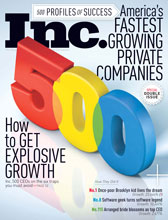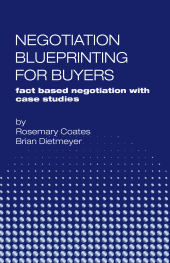 I imagine you've heard the old 80/20 rule to guide your listening and speaking, respectively. This couldn't be more important in a validation meeting, where the primary purpose of meeting is to gain information. The fact that most customers don't even see sharing information as part of the negotiation actually works to your benefit because, as a result, they're likely to share more freely. Ultimately, of course, it's trading information that enables you to learn more about what your customer wants and to let him or her know better what you want. And that, in turn, is what enables you to format offers later that create real value.
I imagine you've heard the old 80/20 rule to guide your listening and speaking, respectively. This couldn't be more important in a validation meeting, where the primary purpose of meeting is to gain information. The fact that most customers don't even see sharing information as part of the negotiation actually works to your benefit because, as a result, they're likely to share more freely. Ultimately, of course, it's trading information that enables you to learn more about what your customer wants and to let him or her know better what you want. And that, in turn, is what enables you to format offers later that create real value.
I've found that it's advantageous to ask questions as systematically as possible - to stick to your plan but not be so rigid that you can't explore unexpected opportunities. The way I usually hanlde this is to send the customer an email asking for an appointment and providing the following information:
- The purpose of the meeting is to find out their needs as they relate to the upcoming negotiation.
- I will primarly be asking questions that allow me to formulate an offer, one that speaks to their needs, sometime after the meeting.
- I will not be presenting price or product at the meeting.
- Some of the questions I'll ask include these:
- What specific items should we focus on in the negotiation?
- How important is each of these items?
- What are some target metrics for each of these items?
- How do you view the supplier landscape in our marketplace?
- What are the strengths and weaknesses of those suppliers?
- What would you like suppliers to do that they don't?
I have found most people are much more willing to share what they want (their Wish List) than what happens if they don't reach agreement with you (their CNA). Asking Wish List questions first gets everbody loosened up and talking. In fact, if you look back at the sample questions I suggested to include in the e-mail, you'll see they are divided into two groups, the first having to do with Wish List items and the second with Consequences of No Agreement (CNA).
For example, rather than simply asking the generic Wish List question, "What specific items should we focus on in the negotiation?" you would say, "It's my understanding you want to focus on price, volume, length of contract and service agreements in the upcoming negotiation. Is that correct? Is there anything missing? Is there anything that should be deleted?" Similarily, instead of asking the generic CNA question, "How do you view the supplier landscape in our marketplace?" you might say, "I understand that if you don't choose us for your partner on this initative, you'll choose ABC Corporation. Is that correct?" Again, by asking the questions in this way, you show the customer you've done your homework and you're likely to get answers that are of more value in developing trades.
Regardless of how you phrase your questions, however, it's important to keep your tone as conversational as possible. Even though your questions have actually been very well thought out and designed to both solicit and share information, people get nervous if they feel you're "filling out a form" and can become self-conscious about what they say. Keeping the conversation as casual as possible helps to ensure a freer flow of information in both directions.
Finally, I suggest you write down what the customer tells you. There are actually two schools of thought on this. The first claims that people are likely to be more guarded if you write down what they say. The other school argues your taking notes makes the speaker feel that you value what he or she is saying and consider it important. My experience suggests that the latter is almost invariably true; recording what customers say doesn't seem to inhibit them at all. Moreover, if there's more that one person on your side in the meeting, having written notes makes it easier to compare what you heard afterwards.
If you're asking customers to provide information during a validation meeting about what they want, it's only natural for them to expect you to reciprocate. In other words, you have to give something to get something. Of course, the idea of sharing information is often counterintuitive for both sides, as many of us have been taught to "keep your cards close to your chest" in a negotiation. Needless to say, it's going to be very difficult to trade data if either you or your customer take that approach. In fact, the only way that both of you can get to a deal better than your CNA and realize as many of your Wish List items as possible is by sharing that information with each other. In fact, the most value-creating agreements I've seen are those in which both sides openly share data on their Wish Lists.
Although the likelihood of that happening in your first validation meeting is slim, the more meetings you have with a customer in which you demonstrate your desire to create joint value, the more the customer will trust you and consequently be willing to share data. The results of a study by the consulting firm A.T. Kearney bear this out. After analyzing trust in high-level business alliances and the effect it had on relationships and profits for both parties, the firm reported two findings, among others, that are of particular significance here. The first was that trust is built between parties based on their actions over time. The second was that a direct correlation exists between trust and profit. What that means in terms of validation meetings is that if you consistenly share data with customers, not only will trust go up but so too will the quality of your agreements and your profits. Again, it may take several negotiations to develop this trust, but it pays off.
But sharing information doesn't only help build trust in a general sense. It can also help you get your customer to share information during the meeting itself. Look at it this way. If I come up and yell at you, there's a good chance that you'll yell back. But if I'm nice and polite to you, there's a good chance you'll be equally nice and polite to me. It's the same with trading data. Let's say, for example, that you say to a customer, "I understand price, volume and length of contract are the key items you're interested in negotiation," and the customer stonewalls you. If you share the same list for your side, and can show the customer that you're willing to trust them, you're much more likely to get a meaningful response when you go back later and ask the same question again.
You obviously must be willing to share the items on your Wish List with your customer because if you don't you'll have nothing with which to trade. But give out information about rank, weight and ranges a little bit at a time, in that order, and in exchange for information from the other side.
"Selling" during a validation meeting is counterproductive. Even if the customer seems to want you to sell him or her - and sometimes they do - you prepared for and promised something else, so stick to your promise. As with "negotiating," if, having said you want to listen, you proceed to just talk, all you'll accomplish is to keep the other side from providing you with the information you came for. Perhaps even more important, when you tell a customer that you're there to understand their needs and you start selling, you can do serious dmage to your credibility as well as to any hope of building trust between you. And without that trust, there is no hope of getting the customer to share the information you need to develop value-creating offers.





